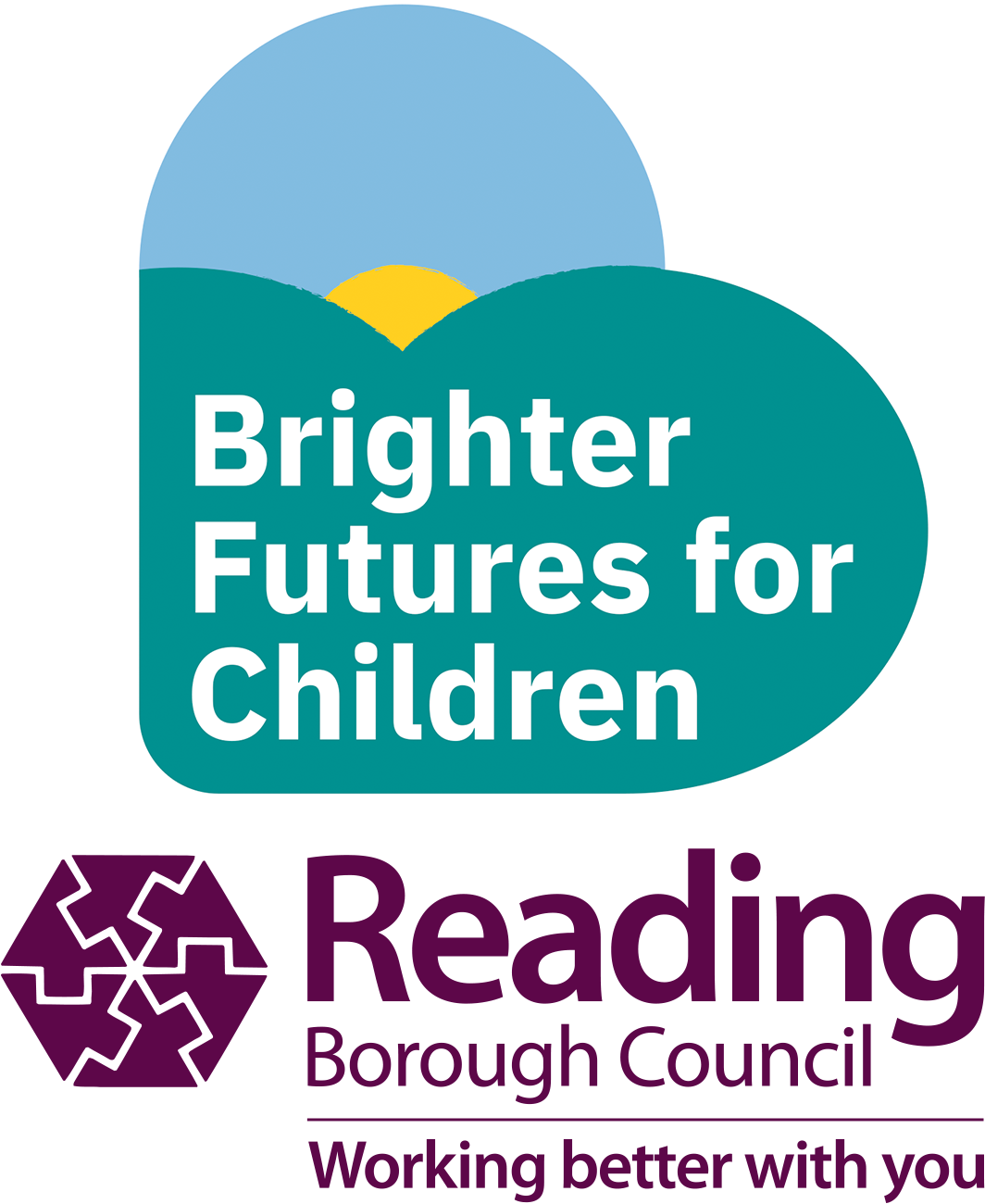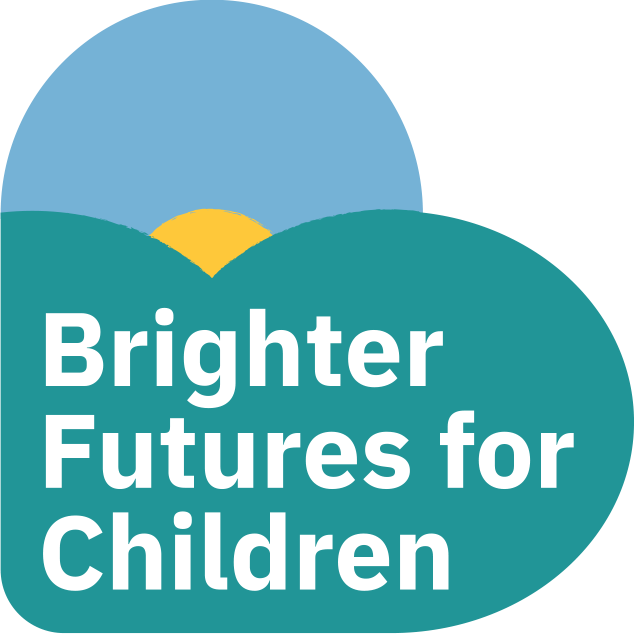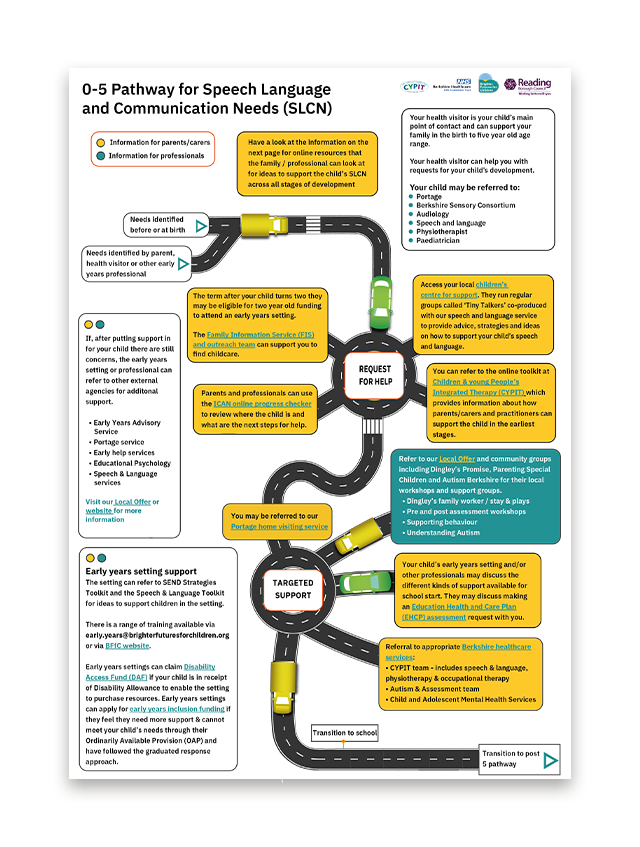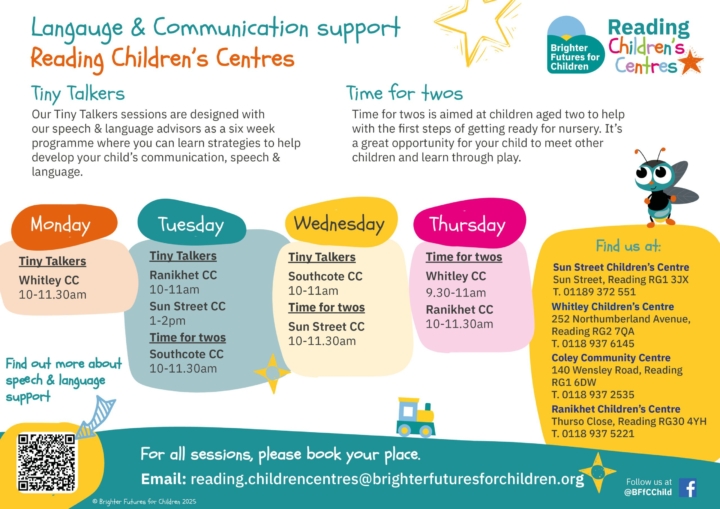- Home
- For parents and carers
- Speech, Language and Communication for Under Fives
Speech, language and communication hub for parents/carers with under fives in Reading
What is speech, language and communication and why is it important?
Speech is:
- making different sounds so that you can speak clearly
- being able to say words so that others understand you
Language includes:
- being able to understand what words mean and following instructions or answering questions
- being able to understand other people’s perspectives (listening)
- having a variety and increasing number of words (vocabulary)
- being able to put words to form sentences and stories
- having a conversation with another person (turn taking).
Communication is:
- understanding and using pre-verbal communication skills e.g. facial expressions, gestures, tone of voice, and body language
- exchanging information with another person
- communication to reach a number of purposes e.g. requesting, commenting, asking questions, giving instructions.

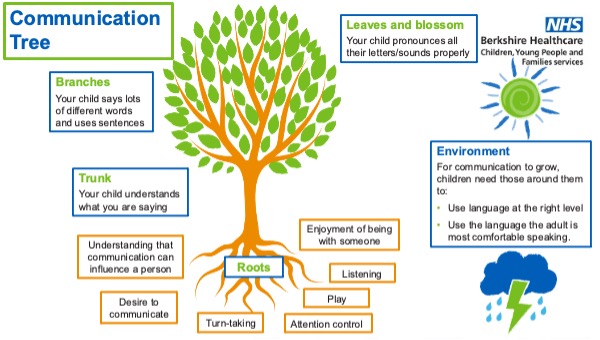
SLCN refers to a difficulty within any area of communication ability. These difficulties can occur on their own e.g. a specific speech and language delay, or as part of another condition such as autism spectrum condition or global developmental delay/learning difficulties.
Some of these difficulties can be resolved when a child is given high quality language support within their environment (e.g. at home and nursery/pre-school). Some children may need extra support from adults in their lives, while others may need longer-term support from specialist services.
Research has shown the first 1001 days of a child’s life are critical for language development. Children are born with their brain ready to be connected and to learn. The experiences children have in their first 1001 days are key for their brain to develop.
This brain development is supported by the experiences and social interactions that a child has in their earliest years. The more positive experiences and interactions they receive, the more brain connections they can make.
Singing and reading stories for example, is so important in those early months. They increase a child’s vocabulary and promote the best outcomes for children.
Up to 50% of children in Reading are at risk of starting school with a speech, language or communication need (SLCN). Some of these needs (about 10%) are due to an underlying speech and language difficulty that make it hard for a child to learn to talk. These children may need support from specialist speech and language services.
Many children can be supported to prevent SLCN if they can access positive experiences and high quality language rich environments. Adults around them can help by using simple speech and language strategies during everyday routines and through play.
This is why we encourage you to:
Chat, play and read with your child every day!
Berkshire NHS has created a visual demonstration of how typical speech, language and communication develops. Using the visual analogy of a tree, it shows how the roots of early communication skills develop into understanding of language which then develops into expressive, verbal language. All these early skills can be developed through high quality play sessions.
Children don’t learn to communicate all by themselves, they need supportive adults to help. This is where the environment is important. Everyone who comes into contact with your child can support their communication skills. You can be the sunshine and the rain needed to feed your child’s communication development. Have a look further down this accordion under the heading ‘Top Tips & Activities to Support your Child’s Communication’ for activity ideas.
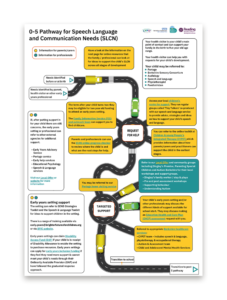
In Reading, we have a speech, language, and communication pathway with links to support available to help your child’s speech and language development.
It includes information about the local library services which hold sessions such as Rhymetime, and Reading children centre’s groups designed to support your child’s communication and interaction development.
The SLCN pathway advises who to speak to if you are concerned about your child’s speech, language and communication development and includes links to support with NHS Berkshire Healthcare Trust Communication and hearing | Children Young People and Families Online Resource which includes online support, monthly parent/carer workshops, and how get help from a speech and language therapist.
You can find advice for specific speech and language development such as stammering, speech sounds, listening and attention and typical speech development here: Speech and Language Therapy | Children Young People and Families Online Resource.
The SLCN pathway also provides further information about targeted support available if practitioners feel your child would benefit from extra help such as the Tiny Talkers groups in your local children’s centres or our portage service, which offers groups and home visits for children with developmental delays.
If you’re concerned your child has other additional needs and requires support, you can find more information about relevant support services via Under 5s with SEND.
We advise you first use the advice and information on this hub and the Berkshire Healthcare NHS Foundation Trust. If you are still worried, then you can ask for help from the Berkshire Healthcare NHS Foundation Children and Young People Speech and Language Therapy team. If you have a Berkshire GP, you can call them on 0118 904 3700 and speak to a speech and language therapist to discuss any concerns about your preschooler’s communication.
The phone line will be open from 9am-3.30pm on a Tuesday and Thursday, from January 2024.
This phone line is also for practitioners who would like to discuss communication concerns.
Many issues can be helped by talking, so give them a call! 0118 904 3700
These are ideas for what you can be doing, at home or when out and about, to support your child’s communication. Many of these activities will support all areas of your child’s communication skills right from the roots of the communication tree and will not always be focused on speaking or words but wider areas of communication.
What’s typical?
You can find out what typical development looks like for your child’s age from Speech and Language UK. There’s an ages and stages section as well as an online progress checker to help you keep track of your child’s communication development.
If your child has a hearing loss or is deaf, support is available for their speech, language and communication development:
There is lots of support available and we have included many of our favourite links below for you to follow. If you are unsure where to go next then speak to your health visitor or pop into your local children’s centre.
- Health Visitor service You can use the ChatHealth service to speak with a health visitor – just send a text message to 07312 263283 and you will receive a response within 24 hours.
- Children and Young People’s Integrated Therapies (Speech & Language Therapy)
- Your local Children’s Centre
- Family Information Service and Reading SEND Local Offer
- Reading Libraries – Reading Borough Council
- Children’s language development and parenting advice – BBC Tiny Happy People
- Speech and Language UK: Changing young lives
- National Literacy Trust | UK Literacy Charity
- BookTrust: Getting children reading | BookTrust
Tiny Talkers
Tiny Talkers is a fun group opportunity to access communication support and advice on speech development. This group is developed in partnership with our speech and language colleagues. Click the image below to open as expanded PDF.
Head over to our Reading Children’s Centres page for the most up to date programme for each site. Click here for the Reading Children’s Centres Facebook page for session updates and other information, or please contact us at reading.childrencentres@brighterfuturesforchildren.org where we will be happy to answer any queries you may have.
Reading Children's Centres
Visit our Reading Children’s Centres pages for up to date programmes.
